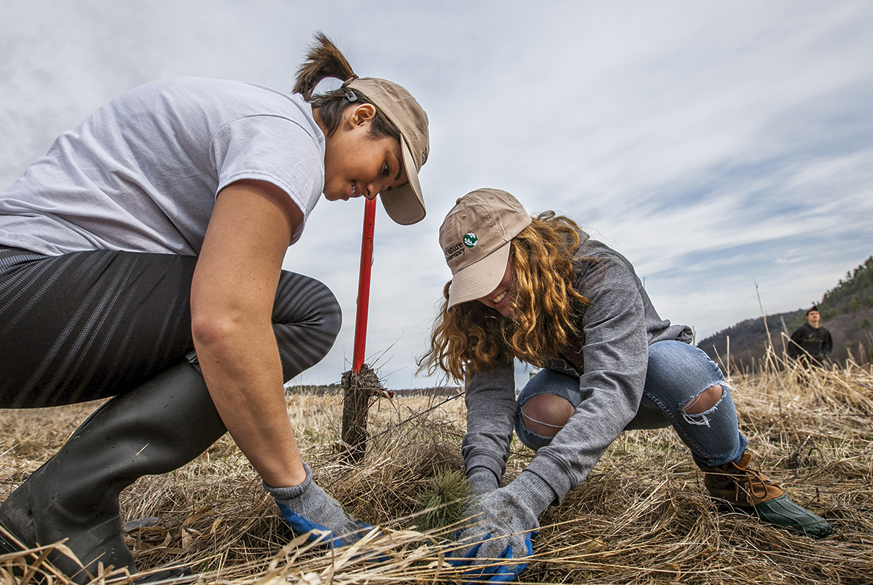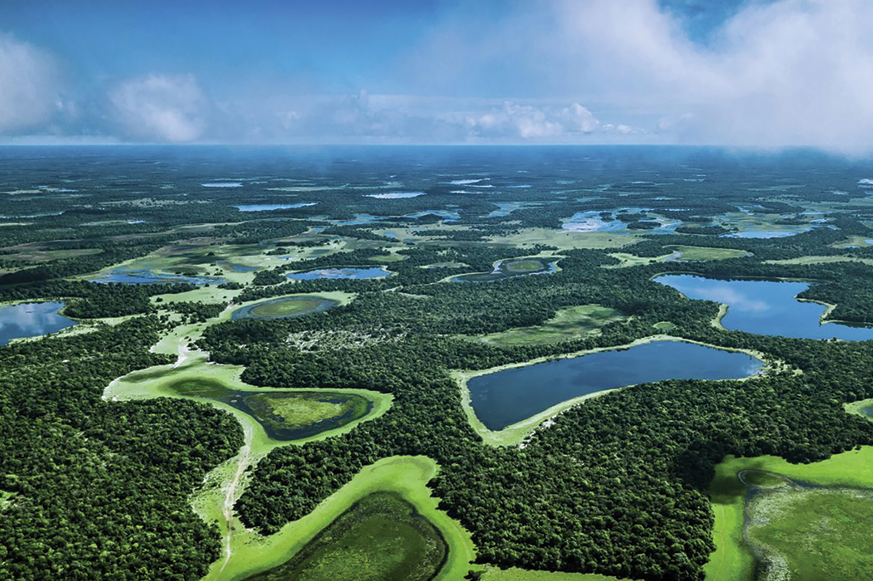- Home
- Media Kit
- MediaJet
- Current Issue
- Past Issues
- Ad Specs-Submission
- Ad Print Settings
- Reprints (PDF)
- Photo Specifications (PDF)
- Contact Us
![]()
ONLINE
![]()
ONLINE

Building an Enduring Legacy
Editors’ Note
Bola Olusanya joined The Nature Conservancy in March 2020 as Vice President and Chief Investment Officer. He provides leadership, vision and oversight to the management and strategic growth of the Conservancy’s multi-billion-dollar endowment and other long-term investment assets. Olusanya has over 25 years of experience in investment management as an executive and a thought leader. Prior to joining TNC, he was a Managing Director at Key Private Bank where he led asset allocation, portfolio strategy and manager research for the bank’s investment management business. Previously, Olusanya was a Managing Director at Strategic Investment Group, an Outsourced-CIO firm, where he co-managed the public equity portfolio as well as the firm’s emerging manager program. Before that, he was a Managing Director at Vanderbilt University’s investment office where he oversaw asset allocation, risk management and manager selection for the university’s endowment. Earlier in his career, he was a Managing Director at IHS Markit (previously Quantitative Services Group LLC), worked at Emory University’s investment office, and held senior positions within the Nigerian banking sector. Olusanya is a board member for TIFF Investment Management and serves on the Investment Committee of the Cleveland Foundation. He obtained his BS in computer science from the University of Ibadan, Nigeria, where he graduated with First Class Honors. He received his MBA in finance from the Goizueta Business School at Emory University and holds an MS in computer science from the University of Lagos, Nigeria.
Organization Brief
The Nature Conservancy (nature.org) is a global environmental nonprofit working to create a world where people and nature can thrive. Founded in the United States in 1951, The Nature Conservancy has grown to become one of the most effective and wide-reaching environmental organizations in the world. Thanks to more than a million members and the dedicated efforts of its diverse staff and more than 600 scientists, it is able to impact conservation in 76 countries and territories across six continents.

Cracked riverbed with an animal footprint
What excited you about the opportunity to join The Nature Conservancy (TNC) and made you feel it was the right fit?
TNC’s mission – to conserve the lands and waters on which all life depends – is more than enough to excite anyone to come work here. We are laser-focused on using science and decades of local on-the-ground experience to tackle the dual threats of climate change and unprecedented biodiversity loss. We have the global scale with a staff of over 4,500 (more than 13 percent of whom are scientists) working in 76 countries; generous donors, supporters, volunteers, and members (numbering over 1 million); and an uncompromising leadership team that fully understands the gravity of the challenges we face. So, for someone like me – with two young boys – who is deeply concerned about the future of our planet, it was a no-brainer to be excited about joining TNC.
Beyond the mission, I saw an incredible opportunity to build an enduring legacy for the management of TNC’s endowment and long-term investment assets. Despite a balance sheet of almost $9 billion and long-term investment assets of approximately $4 billion, we didn’t have an internal investment team before I joined. Instead, TNC relied on consultants and outsourced investment advisory firms to make investment decisions on our behalf. Such outsourced investment models make sense for small institutions, typically with investment assets of less than $1 billion, who often lack the brand recognition to attract investment talent or partner with premier investment managers. TNC doesn’t have that problem – in fact, due to our all-important mission and our track record of effectiveness, we are often courted by these premier investment managers. Yet, for some inexplicable reason, we didn’t have an in-house investment team. The opportunity to build a first-class investment team really excited me.
Finally, the challenge of reshaping and managing a high-performing investment portfolio that is fully aligned with TNC’s mission and values was a big attraction. Even today, there are those who still maintain that integrating ESG principles – decarbonization, climate mitigation and adaption investing, impact investing, sustainability, diversity, equity, and inclusion – in an investment portfolio would result in diminished prospective investment returns. I am not in that camp. Instead, I believe that integrating practical ESG principles is not only common sense, but also a tailwind for improved prospective risk-adjusted returns. In addition, for many institutions with endowments, investment offices are islands, often fully detached from the rest of the organization. With the brilliant minds on staff at TNC, especially our top-notch scientists, it was incomprehensible to me that we weren’t leveraging their insights to align the portfolio with our mission and improve our investment returns.
Given my background, I felt I was uniquely qualified to actualize this vision. It’s been less than three years, but I’m very proud of the progress we’ve made thus far.

Planting a young American elm seedling at
Hubbardton River Clayplain Natural Area, Vermont
Will you provide an overview of your role and areas of focus?
As Chief Investment Officer, I provide leadership, vision and oversight to the management and strategic growth of TNC’s endowment and other long-term investment assets totaling about $4 billion. These assets are very important to TNC. They support our global operations and our most pressing conservation projects. For example, the annual endowment payout of 5.75 percent (of the average endowment value over a rolling three-year period) supports 10 to 15 percent of our annual operating budget.
Since I joined in early 2020, we have built a diverse team of 12 investment and operations professionals who work in our Office of Investments. With support from our Global Board’s Investment Committee of esteemed investment and risk management experts, we are charged with preserving and growing our investments through prudent management.
To do this, we partner with world-class investment managers and embrace alternative investments like private equity, venture capital and hedge funds for their diversification and return-enhancing characteristics. We take the long-view of investing – allowing us to think independently during periods of market turbulence (like the one we’re going through right now) while maintaining a disciplined focus on long-term growth. We bring a similar mindset to our investment partnerships and believe that exceptional investment judgment is rare, so we embrace the power of compounding through multi-year relationships.
How do you define TNC’s culture?
TNC is a global, decentralized, and matrixed organization with various semi-autonomous state, country and regional chapters harmonized by one central leadership. While this complex structure comes with its own growing pains, our on-the-ground presence, intimacy, and data-driven knowledge make us one of the most effective conservation organizations in the world. As a result, we are able to attract people who are passionate about our mission in the communities they live in and are looking to make measurable impact.
A common refrain here at TNC is that our colleagues “join for the mission, but stay for the people.” I’ve worked at some very impressive institutions, including Vanderbilt University and Emory University, but without a doubt, the people here at TNC are the most impressive and accomplished that I’ve ever worked with. It’s these people who are at the heart of our rich and inclusive culture – one that fosters a transparent workplace dedicated to respect for all.
TNC has made mistakes in its 71-year history when partnering with Indigenous and local communities. What I find most impressive is that – for a large, complex organization – we’re continuously working to live by our values and learning from these mistakes to become a more resilient organization.

An aerial view of part of the 42 million acre
Pantanal wetlands in Brazil
Will you discuss TNC’s investment strategy and how critical are ESG and impact investing to TNC’s investment philosophy?
We believe strongly that sustainable business practices can yield attractive financial returns as well as positive externalities for stakeholders and the environment. So, we carefully integrate such considerations into our investment strategy and strive to employ investment managers who use ESG criteria to inform their investment decisions.
We also exclude certain opportunities from our endowment and other long-term investment portfolios when we deem them inconsistent with our mission. These tend to be opportunities that involve extractive industries, high carbon-intensive businesses, or those that have high environmental damage costs due to excessive natural resource use.
We have a growing private equity portfolio where we proactively invest in companies that are leading the decarbonization of the global economy. Here we place a strong emphasis on climate technology and other strategies that focus on climate solutions, given our mission. Our goal is to be a leading investor in this space, and I should quickly add that these are not concessionary investments. We don’t make concessionary investments within our endowment or long-term investment pools. All these investments are made with the explicit goal of generating market-beating returns.
Lastly, we apply a Diversity, Equity, Inclusion, and Justice (“DEIJ”) lens to all our investments, reinforcing TNC’s mission of “living our values.” We want the investment managers we partner with to be representative of the cultural diversity of the places we perform our conservation work. As such, we hope to promote underrepresented communities in the financial industry without sacrificing financial returns. Not surprisingly, the investment team we built is very diverse when viewed through the lens of inherent (race and gender) and acquired (education and socioeconomic background) diversity metrics.
How did TNC adapt its work to address the challenges caused by the global pandemic?
The human toll and the disruption of our daily livelihood caused by the global pandemic has been staggering. Since TNC is a global organization, we were well equipped for the worldwide embrace of virtual meetings via Zoom and Microsoft Teams. But our conservation work often involves physical interactions with people and partner organizations in local communities, so we were ill-prepared for a world with limited or no travel, lockdowns, and lack of physical interactions.
I joined TNC at the onset of the pandemic – March 16th to be precise. And I remember speaking to the head of our India business unit as part of my orientation as she lamented about COVID grounding her team’s fieldwork. I heard similar stories from other teams in the field. It was undoubtedly a very tough period, but we managed through it and we’re all glad that most economies have opened up to pre-COVID levels.
As far as our investment portfolio was concerned, the pandemic provided some silver linings. We were able to hire a talented team and leveraged our brand and the market uncertainty to upgrade our portfolio. We also quickly adapted to the new reality that we had to rely on virtual meetings to conduct due diligence on new investment managers. While efficient, we also knew that this couldn’t be the norm – nothing beats interacting with people live in a 3D world!

Yurok tribal members collect tanoak acorns on
traditional Yurok land in Klamath, California
You have written several books featuring your poems. Where did this interest develop and what do you hope to convey through your poems?
I like to refer to myself as an accidental poet. Although I’ve always been a student of literature and was a prominent campus journalist during my college years in Nigeria, I never considered myself a poet - not until I was “forced” to start writing poetry at the age of 18 after being afflicted with a life-threatening ailment. Why poetry, you’d ask, right? The nature of my sickness was such that I was in constant pain and bedridden during the day, but nighttime came with short bursts of energy that only lasted long enough to allow me to convey my thoughts in a condensed form, compared to the prose I was used to as a journalist. And because I thought I was going to die, I felt compelled to use that time wisely, articulating my thoughts on paper, always time stamped. So, poetry became an outlet to express my thoughts as my vulnerability, and that of all of us, dawned on me. Luckily, I cheated death, and it’s no coincidence that my first collection was titled “Nocturnal Notes.”
I write about various topics – from my Nigerian upbringing and culture, politics, racism, microaggression, vanity, immigration, and death, to love, family and religion.
What do you see as the keys to effective leadership and how do you describe your management style?
I think effective leadership starts with self-awareness. As a leader, it’s important to understand your strengths and your weaknesses – yes, we all have blind spots. You want to surround yourself with people who allow you to project and maximize your strengths, but whose strengths are in areas where you exhibit your highest weaknesses. You also want to empower them to challenge you and take shared ownership of decisions even when those decisions go against their initial inclinations. I strongly believe that no person is an island of unlimited knowledge, and that everyone on the team has a role and a voice that should be heard.
My management style is collaborative even though it may appear to be less democratic. I want to hear from many people with different points of view. I think this allows for the best decisions to be made. But I don’t think the majority should always carry the vote. I like when people think outside the box and are not afraid to be wrong or sound crazy. Arthur B. MacDonald, the Canadian Nobel Laurate in Physics, once said that “behind every success, there is effort, behind the effort there is passion and behind the passion, there are people with the courage to try.”
Ultimately, I recognize that as a leader, it is my job to make tough decisions and I don’t ever shy away from them.
What advice do you offer to young people beginning their career during this unprecedented time?
My advice to them would be to focus on what they are passionate about that will have an enduring impact on the world. We have barely scratched the surface in exciting areas such as artificial intelligence, machine learning, climate technology, genomics, space exploration, and blockchain/web3. All these fields have the potential to change the world in positive ways and those entering the workforce today will be the legends of tomorrow. My hope is that they will choose wisely.![]()